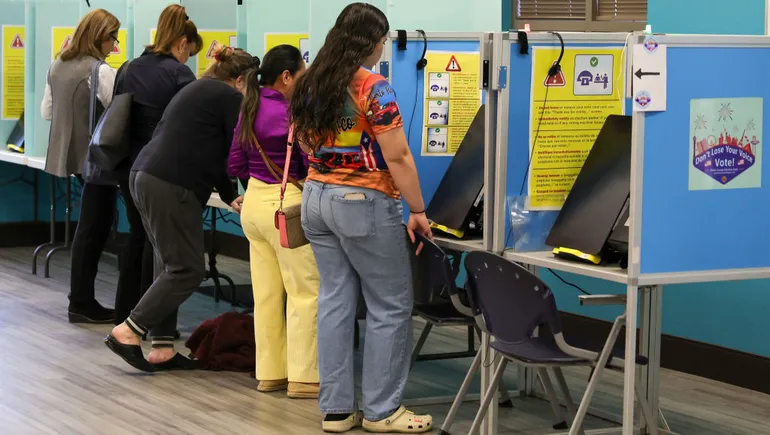Higher education leaders never had a doubt that the outcome of this week’s election would have significant ramifications on the sector. A new U.S. president almost always comes into office with new priorities, shifting expectations as often as every four years — a split second compared to some academic timelines.
That’s especially true when one candidate — the ultimate victor — included ending the U.S. Department of Education in his campaign platform.
But Tuesday also brought changes to higher education policy at the state level. Voters across the country weighed in on 12 education-related state ballot measures, more than twice the education initiatives in 2020 and the highest number seen since 2006.
Many of the proposals focused on K-12 issues such as school choice. But a handful raised important issues that could — and in some cases will — affect how colleges in four states are funded and overseen.
Here is an overview of the state ballot issues affecting higher education.
Nevada
Nevada voters Tuesday once again voted down a proposal to dissolve the state’s university board of regents.
In Nevada, the board is enshrined in the state’s constitution and voters elect its members.
The ballot measure, Question 1, would have put Nevada’s eight universities completely under the purview of the Legislature, control of which has changed hands regularly in the reliably purple state.
Like the parties’ control of state politics, support for the measure was split. Some former education leaders said the change would improve accountability and transparency in Nevada’s higher education system. But other advocates, including the Nevada State Education Association, argued doing away with the board would impinge on democracy in the state.
Voters settled the issue, with 54.6% opting to preserve the current system for choosing regents as of Thursday afternoon. according to the New York Times.
The issue may not die with this year’s elections, however, as this was not the first time the state has put it on the ballot. In 2020, voters shot down a challenge to the board’s constitutional status with a tight 50.15% majority.
Arkansas
An overwhelming majority of Arkansas voters Tuesday approved a ballot measure to open up the state’s lottery-funded scholarships to residents attending vocational programs and technical institutions.
Proceeds from the Arkansas Scholarship Lottery currently go to scholarships for residents attending two- and four-year colleges in the state.
Last year, state lawmakers from both sides of the aisle supported including technical and trade education in the program. Arkansas had over 75 technical and vocational schools as of 2021, according to the educational data aggregator Become.
As of Thursday morning, 89.5% of state voters had approved the expansion, according to the New York Times.
The ballot measure’s language is broad, but the Arkansas Advocate reports that the change could go into effect as soon as next fall.
California
California will issue $10 billion in bonds to repair its public education facilities, thanks to voters’ approval of Proposition 2. That includes $1.5 billion allocated for the state’s 116 community colleges.
The California Community College Chancellor’s Office estimated the system’s college facilities will face $27.5 billion in unmet needs over the next five years.
Amy Costa, president of the CCC board, said in September that Prop 2 funding would allow the system to “enhance the education and training of a skilled 21st century workforce” by offering quality facilities and supporting student needs.
As of Wednesday evening, California was still counting ballots. But the state announced that 56.9% of voters had supported Prop 2 so far, and the Associated Press has called a “yes” for the vote.
Rhode Island
As in California, Rhode Island voters Tuesday approved issuing millions of dollars in bonds to fund improvements to their state’s higher ed facilities.
The dramatically smaller state will direct $160.5 million in funding to its three public institutions.
A bulk of the funds, $87.5 million, will go toward constructing a biomedical science building at the flagship University of Rhode Island. The remaining $73 million is earmarked for modernizing Rhode Island College’s cybersecurity institute.
As of Thursday afternoon, 59.7% had voted for the ballot measure, according to the New York Times.
Rhode Island voters have consistently approved increased bond funding for the state’s higher education campuses, passing six such ballot measures between 2010 and 2022.

